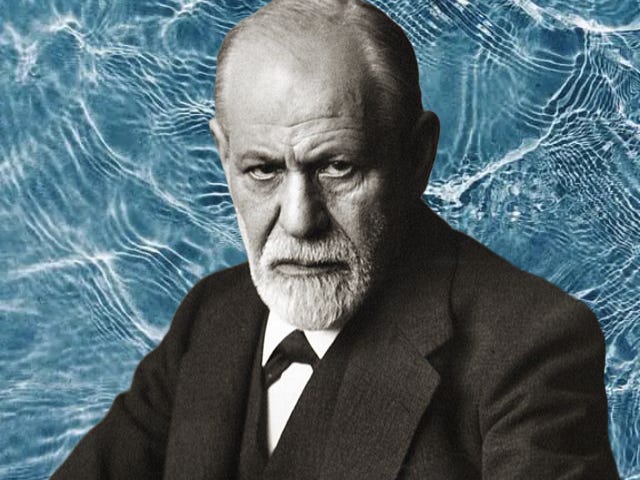Freud paved the way for our culture’s present obsession with sexuality; God’s limitations on sexual behavior would be cast aside, and humans would rewrite the rules.
Freud considered belief in God as a fantasy based on a person’s infantile need for a dominant father figure, even though he saw religion as a necessity in the development of early civilization to help restrain people’s violent impulses. But as humanity becomes more educated, belief in God can and must be discarded.
Freud is known for putting sex—specifically, sexual pleasure—at the center of human existence. He perpetuated “the idea that sex, in terms of sexual desire and sexual fulfillment, is the real key to human existence, to what it means to be human.”[1] Sexual pleasure is, in effect, our birthright.
In his essay Civilization and Its Discontents, Freud wrote:
Man’s discovery that sexual (genital) love afforded him the strongest of satisfaction, in fact provided him with the prototype of all happiness, must have suggested to him that he should continue to seek the satisfaction of happiness in his life along the path of sexual relations and that he should make genital eroticism the central point in his life.[2]
Thus Freud promoted the pleasure principle: A quest for pleasure focused on sexual gratification is central to being one’s self. And without a belief in original sin, and because he saw no need to put limits on sexual expression, Freud argued for sexual freedom. Whatever brought you pleasure was justified, and God as lawmaker would vanish. God was a fantasy, and sexual liberation was the path to happiness.
To Freud, the repression of sexual desire is the source of many of our frustrations and neuroses. Thus, the biblical prohibitions limiting sexual relations to within a marriage of one man and one woman was an arbitrary command taught by Christianity that resulted in unnecessary and harmful guilt. Even infants can experience sexual pleasure, and this should be encouraged, not shamed.
Freud’s teaching was further popularized by Alfred Kinsey of Indiana, a bisexual who interviewed convicted sex offenders, child molesters, and people who committed sexual assault. He passed his findings along as if he had interviewed average Americans, and only later was it revealed that his research was based on interviews with people who would give him the answers he wanted. Kinsey not only claimed that children can be sexual but concluded “that so called intergenerational sex—a polite euphemism for child rape—poses no serious harm to children.”[3]
These ideas were widely publicized in his books during the early 1950s and were eagerly believed. As history shows, whether it is ancient Israel or modern America, mankind has always been eager to break with biblical sexual norms. Not surprisingly, Kinsey also believed that adultery did not undermine a marriage as long as neither party became emotionally involved.
To recap: Freud and his disciples despised the idea that God was a lawgiver who created us as sexual beings and then set down the rules for sexual behavior. Now that the “fantasy” of God had been exposed, mankind was free to reject the idea that sex should be confined to marriage based on a binding covenant. With this newly discovered freedom, the desires of genital pleasure could be maximized. As for guilt, it was simply a feeling that had to be unlearned.
So, freed from the commands of God regarding sexual conduct, man took the place of God and put himself firmly in place as his own lawgiver. Away with Sinai and welcome to what Aldous Huxley called the “brave new world”!
Notes
1. Carl R. Trueman, The Rise and Triumph of the Modern Self (Wheaton, IL: Crossway, 2020), 203.
2. Sigmund Freud, Civilization and Its Discontents, trans. James Strachey (New York: W.W. Norton, 1989), 56.
3. Matt Walsh, What Is a Woman? (Nashville, TN: DW Books, 2022), 33-35.
— Dr. Erwin W. Lutzer is Pastor Emeritus of The Moody Church, where he served as the senior pastor for 36 years. He is an award-winning author and the featured speaker on three radio programs that are heard on more than 750 national and international outlets.
---
Excerpted from The Eclipse of God: Our Nation’s Disastrous Search for a More Inclusive Deity (And What We Must Do About It) by Erwin W. Lutzer (Harvest House Publishers, 2024). Used by permission.
In The Eclipse of God, bestselling author Erwin Lutzer exposes our nation’s disastrous efforts to redefine God in its own image. The resulting damage has been so great that confusion about God has even crept into the church. This bold exposition will help you
-
understand society’s attempts to make God inclusive and sin-friendly by exploring the intellectual roots of the present darkness
-
renew your faith in God by replacing worldly misperceptions of Him with the biblical truths about His unchanging character
-
resist cultural conformity by counting the cost of faith as you shine the gospel’s light with accuracy and grace
Timely and practical, The Eclipse of God will deepen your love for the sovereign God of the Bible and empower you to live and speak as a light for Him in a culture of darkness.
“Filled with wisdom and insight for a culture running from God, Erwin Lutzer reveals gem after gem in The Eclipse of God. I burned up a highlighter reading this book!”
— Dr. Frank Turek, CrossExamined.org and coauthor of I Don’t Have Enough Faith to Be an Atheist
“Pastor Lutzer will take you on an enlightening journey that will not only open your eyes to the spiritual battles we face, but will also equip you to confidently proclaim the truth of who God really is in a culture that imagines Him to be someone very different.”
— Natasha Crain, speaker, podcaster, author of four books including Faithfully Different
Find The Eclipse of God at Harvest House, Amazon, Barnes & Noble, and Christianbook.com.
*sponsored











